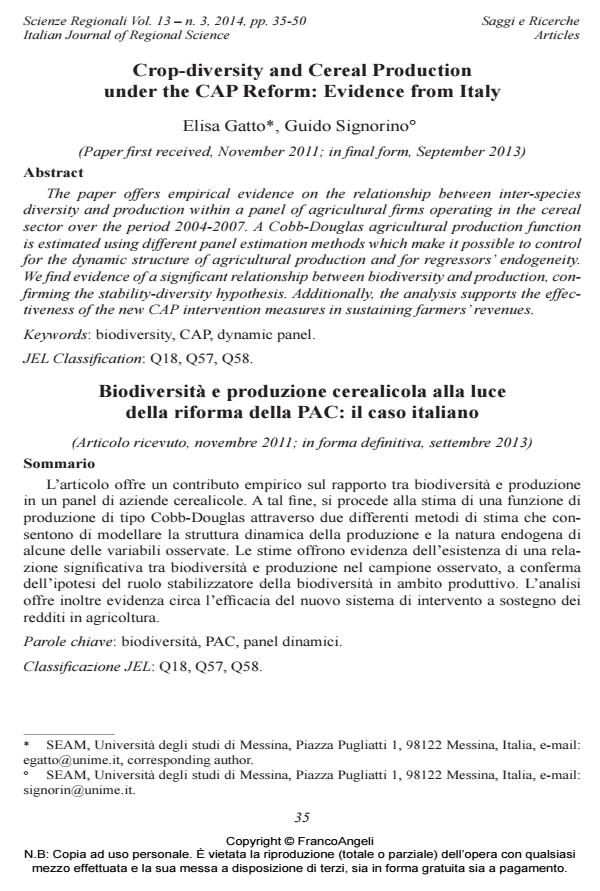Crop-diversity and Cereal Production under the CAP Reform: Evidence from Italy
Titolo Rivista SCIENZE REGIONALI
Autori/Curatori Elisa Gatto, Guido Signorino
Anno di pubblicazione 2014 Fascicolo 2014/3
Lingua Inglese Numero pagine 16 P. 35-50 Dimensione file 5267 KB
DOI 10.3280/SCRE2014-003002
Il DOI è il codice a barre della proprietà intellettuale: per saperne di più
clicca qui
Qui sotto puoi vedere in anteprima la prima pagina di questo articolo.
Se questo articolo ti interessa, lo puoi acquistare (e scaricare in formato pdf) seguendo le facili indicazioni per acquistare il download credit. Acquista Download Credits per scaricare questo Articolo in formato PDF

FrancoAngeli è membro della Publishers International Linking Association, Inc (PILA)associazione indipendente e non profit per facilitare (attraverso i servizi tecnologici implementati da CrossRef.org) l’accesso degli studiosi ai contenuti digitali nelle pubblicazioni professionali e scientifiche
The paper offers empirical evidence on the relationship between inter-species diversity and production within a panel of agricultural firms operating in the cereal sector over the period 2004-2007. A Cobb-Douglas agricultural production function is estimated using different panel estimation methods which make it possible to control for the dynamic structure of agricultural production and for regressors’ endogeneity. We find evidence of a significant relationship between biodiversity and production, confirming the stability-diversity hypothesis. Additionally, the analysis supports the effectiveness of the new CAP intervention measures in sustaining farmers’ revenues.
L’articolo offre un contributo empirico sul rapporto tra biodiversità e produzione in un panel di aziende cerealicole. A tal fine, si procede alla stima di una funzione di produzione di tipo Cobb-Douglas attraverso due differenti metodi di stima che consentono di modellare la struttura dinamica della produzione e la natura endogena di alcune delle variabili osservate. Le stime offrono evidenza dell’esistenza di una relazione significativa tra biodiversità e produzione nel campione osservato, a conferma dell’ipotesi del ruolo stabilizzatore della biodiversità in ambito produttivo. L’analisi offre inoltre evidenza circa l’efficacia del nuovo sistema di intervento a sostegno dei redditi in agricoltura.
Parole chiave:Biodiversità, PAC, panel dinamici. Classificazione
Jel codes:Q18, Q57, Q58.
Elisa Gatto, Guido Signorino, Crop-diversity and Cereal Production under the CAP Reform: Evidence from Italy in "SCIENZE REGIONALI " 3/2014, pp 35-50, DOI: 10.3280/SCRE2014-003002